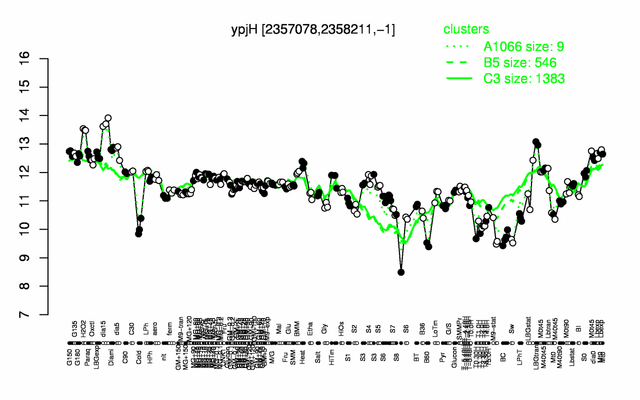BshA
Revision as of 14:20, 17 April 2014 by 134.76.70.252 (talk)
- Description: L-malic acid glycosyltransferase, involved in bacillithiol synthesis
| Gene name | bshA |
| Synonyms | jojH, ypjH |
| Essential | no |
| Product | L-malic acid glycosyltransferase |
| Function | biosynthesis of bacillithiol |
| Gene expression levels in SubtiExpress: bshA | |
| MW, pI | 41 kDa, 6.149 |
| Gene length, protein length | 1131 bp, 377 aa |
| Immediate neighbours | cca, bshB1 |
| Sequences | Protein DNA DNA_with_flanks |
Genetic context 
This image was kindly provided by SubtiList
| |
Expression at a glance PubMed
| |
Contents
Categories containing this gene/protein
miscellaneous metabolic pathways, resistance against oxidative and electrophile stress
This gene is a member of the following regulons
The gene
Basic information
- Locus tag: BSU22460
Phenotypes of a mutant
Database entries
- BsubCyc: BSU22460
- DBTBS entry: no entry
- SubtiList entry: [1]
Additional information
The protein
Basic information/ Evolution
- Catalyzed reaction/ biological activity: UDP-GlcNAc + L-malate = GlcNAc(α1→2)L-malate PubMed; also uses D-malate as a substrate, but with much lower affinity PubMed
- Protein family: NamA subfamily (according to Swiss-Prot)
- Paralogous protein(s):
Extended information on the protein
- Kinetic information:
- Domains:
- Modification:
- Cofactor(s):
- Effectors of protein activity:
- subject to feedback inhibition by bacillithiol PubMed
Database entries
- BsubCyc: BSU22460
- UniProt: P42982
- KEGG entry: [2]
- E.C. number:
Additional information
Expression and regulation
- Additional information:
- number of protein molecules per cell (complex medium with amino acids, without glucose): 168 PubMed
- number of protein molecules per cell (minimal medium with glucose and ammonium, exponential phase): 443 PubMed
- number of protein molecules per cell (minimal medium with glucose and ammonium, early stationary phase after glucose exhaustion): 291 PubMed
- number of protein molecules per cell (minimal medium with glucose and ammonium, late stationary phase after glucose exhaustion): 366 PubMed
Biological materials
- Mutant:
- bshA::mls available in John_Helmann lab
- GP88 (bshA::pX2(cat)), available in Jörg Stülke's lab
- Expression vector:
- lacZ fusion:
- GFP fusion:
- two-hybrid system:
- Antibody:
Labs working on this gene/protein
Your additional remarks
References